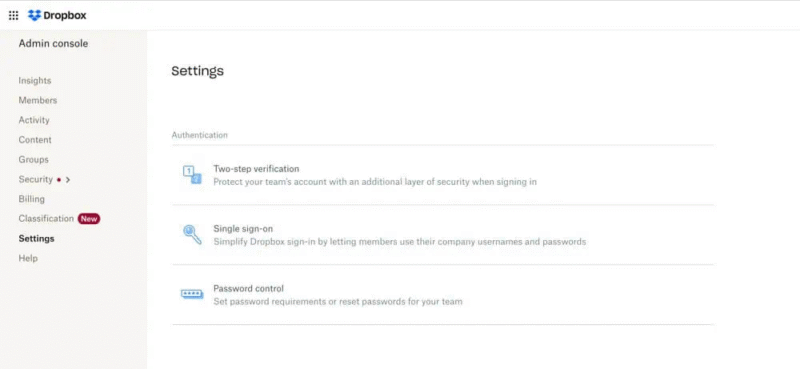Enterprise Cloud Storage: The Best Software Solutions & Buyer’s Guide in 2026
There’s no shortage of excellent cloud data storage options that meet the needs of an enterprise-sized organization. Security, privacy, file sharing, external connections and in-house productivity apps are all considerations. Fortunately, we round up the best enterprise cloud storage providers to help you decide.
In this article, we’re going big — enterprise big. We’re sharing our selection of the best enterprise cloud storage plans currently available for your business. We’ll cover the expected features, the differences between enterprise options and standard business plans, and the top enterprise cloud storage services for various users.
Almost all of the best cloud storage services offer an enterprise plan to consumers. Some act as a large-scale cloud service for data backup and file sharing, while others can run alongside your own applications and internal software. We’ll explain that in greater detail shortly, including the expected cost for this level of service.
-
11/20/2023 Facts checked
This article was rewritten to include updated providers, features and pricing.
-
04/25/2025 Facts checked
We updated the article to include new providers for enterprises and update the order of the services.
-
07/09/2025 Facts checked
We’ve rewritten this article to include more services that suit different enterprise use cases.
Cloudwards’ Choice: Sync.com
What Is Enterprise Cloud Storage?
Enterprise cloud storage is designed for larger teams and organizations. These plans tend to offer higher storage capacities, greater control over your security settings, and personal branding options. Users can also expect more detailed advice and faster response times from the support team.
What Makes a Cloud Storage Provider Suitable for Enterprises?
Users should expect certain features and perks when signing up for enterprise cloud storage. If a service doesn’t provide the core features below, then it’s not worth investing in the product.
10,000+ Trust Our Free Cloud Storage Tips. Join Today!
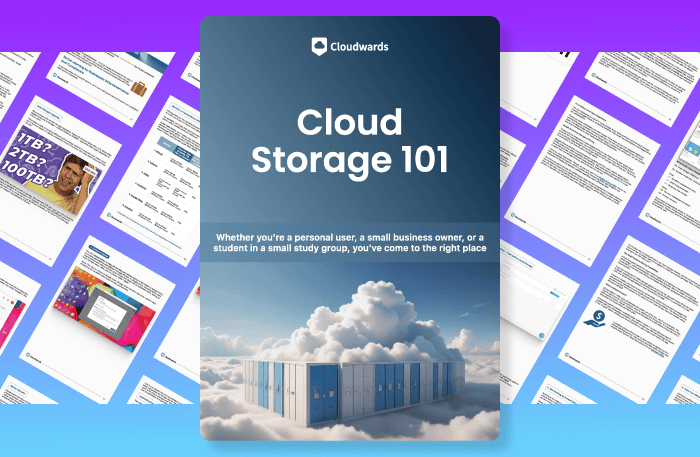
- Demystify cloud storage terminology and key concepts in plain language
- Discover easy-to-implement techniques to securely backup and sync your data across devices
- Learn money-saving strategies to optimize your cloud storage costs and usage
- Dedicated account management
- Faster service-level agreements (SLAs)
- Broader security features
- Remote administrative portal
- More cloud storage capacity
- Deeper analytics and reporting capabilities
Enterprise Cloud Storage vs Business Cloud Storage vs Cloud Computing: Differences, Use Cases & Examples
Below, we’ll cover three different tiers of cloud computing. This will help you decide what type of cloud account you need so you don’t misplace your time and money.
Types of Cloud Options Compared
**Personal plan only
The table below provides a deeper overview of the differences between entry-level business cloud storage, enterprise cloud storage and larger cloud computing services.
| Comparison Factor | Business Cloud Storage | Enterprise Cloud Storage | Cloud Computing Platforms |
|---|---|---|---|
| Pricing | Affordable monthly plans; pay for storage used | Higher cost; customized pricing based on needs | Pay-as-you-go plans; flexible based on compute, storage and services |
| Scalability | Limited scalability for small to medium teams | Highly scalable to support large organizations | Designed to scale globally for compute, storage and networking |
| Enterprise Resource Planning (ERP) | Typically not included | Often integrates with ERP and business tools | Offers ERP services or integration via third-party platforms |
| Security & Compliance | Basic encryption and access controls | Advanced security, compliance (HIPAA, GDPR, etc.) | Customizable high-level security and compliance options |
| Integration Capabilities | Works with common office tools (Google Workspace, MS 365) | Deep integration with business systems like customer relationship management (CRM), ERP and identity systems | Integrates with a wide range of services, APIs and custom apps |
| User & Access Management | Simple user controls; suitable for small teams | Granular access controls; role-based permissions | Full identity and access management (IAM) systems with policy control and federation support |
| Support & SLAs | Basic support; limited uptime guarantees | Premium support with strong SLAs and account management | Enterprise-grade SLAs; 24/7 support with dedicated engineers if needed |
| Storage Capacity | Suitable for small to moderate file storage | Large-scale storage for structured and unstructured data | Storage is part of a broader infrastructure; block, file and object storage are available |
The 10 Best Enterprise Cloud Storage Services Compared
Enterprise Cloud Storage Speed Comparison
Our team runs regular speed and performance tests for every provider that we review. The process is simple. We upload and download a 5GB folder with various file types on a 1GB internet connection in Dublin, Ireland. We throttle speeds to 100 Mbps and then run them back without throttling them.
Speed-wise, IDrive is consistently the top performer. Sync.com is often one of the slowest providers out of the top services. Remember, these results are based on a testing environment; while the numbers may differ on paper, you’ll barely notice a difference in the real world.
In terms of performance, we look at how much pressure a service puts on your computer’s resources when uploading and downloading files. This is important because it impacts your ability to perform other tasks while your cloud storage is doing its thing in the background.
All of the services in this selection displayed low to medium CPU usage. Dropbox and Sync.com put the least amount of pressure on our device. However, these are fine margins, and each service will give a smooth user experience without crashes or lags.
Cloudwards Speed Test Results: Raw Numbers
1. Sync.com — Best Enterprise Cloud Solution for Large Businesses
Sync.com’s Enterprise plan targets larger businesses with a minimum of 100 users. It’s already an excellent security and privacy powerhouse offering plenty of controls, including client-side encryption. You can even enforce two-factor authentication (2FA) company-wide and set granular controls for different team members and departments.
The Enterprise plan comes with truly unlimited storage space and unlimited data transfers. However, file-size uploads are capped at 40GB, which is still plenty for most users. Your account admin can assign folders and delegate administrative controls to managers, allowing them to manage user passwords and access.
Sync.com Hands-On Testing
We had a positive experience with Sync.com. Its features are on full display, with little hidden behind submenus. The Enterprise plan offers a unique user admin panel — the tabs are placed in a left-hand menu rather than at the top, but this barely impacts its ease of use.
The admin panel allows you to invite new users or pay to add more to your quota. You can scale your account with a simple click, and easily determine roles and permissions. Despite the muted design, Sync.com has done a stellar job of creating an enterprise UI that’s not overwhelming or difficult to grasp.

Sync.com Pricing & Value
Sync.com Enterprise pricing is negotiable. If we use the plan below as a marker, then the lowest price you can expect to pay is around $18 per user per month on annual billing. Having more users will increase your likelihood of negotiating a lower price per person. Learn more in our Sync.com review.
- 5GB
- 2TB
More plans
- 6TB
- per user, per month, billed annually
- 1TB
- Priced per user (3 users minimum)
- Unlimited GB
- Minimum 100 users, custom requirements, account manager, training options
2. Tresorit — Best Cloud Solution for Global Companies
Tresorit’s UI has a sleek, professional look that’s perfect for enterprise companies. The top-tier plan offers flexible storage options based on your needs, and each user can back up a maximum of 10 devices. You can also access multiple data centers around the globe, ensuring you get fast performance no matter your location.
Tresorit reserves some file-sharing features exclusively for the Enterprise plan. Administrators can see who has viewed a file and track how often it is downloaded. They can also control which users can share files and enable auto-deletion for files that need to be shared temporarily.
Tresorit Hands-On Testing
At the heart of Tresorit’s design is a professional touch. It feels like it’s built for enterprises that prefer a well-engineered product over an artistic design. Moreover, we like that we can add a company logo for a more branded look. Features like sharing files, assigning folders and managing users all function as you’d expect from a cloud storage service.

Tresorit Pricing & Value
Tresorit’s Business plans are pretty reasonable, costing up to $19 per user per month on annual billing. You can negotiate the Enterprise plan, but you must bring a minimum of 50 users. A free trial is also available. You can find more details in our Tresorit review.
- 50GB
- Price per user (billed annually), Storage per user, User count: 3+
- 1TB
- 3+ room managers, 15 contributors, unlimited viewers, unlimited data rooms, 15GB max file size & more.
- 6TB
More plans
- 500MB file-size limit, Maximum 2 devices
- 3GB
- Price per user (billed annually), Storage per user, User count : 1
- 2TB
- 1TB
- 4TB
- 1 room manager, 5 contributors, unlimited viewers, unlimited data rooms, 10GB max file size & more.
- 4TB
- Custom room managers and contributors, unlimited viewers, unlimited data rooms, custom storage, 20GB max file size & more.
- Price per user (billed annually), Storage per user, User count : 50+
3. pCloud Business — Best Cloud Storage for Multimedia Enterprises
pCloud is one of the best small business storage solutions, as it requires a minimum of only three users. It also scales easily as you can quickly add new users if your business grows. Each user gains access to 2TB of storage space, and there are no file-size upload limits on your account.
Unlike with the non-business plans, client-side encryption is included in your standard subscription. For security, the account administrator can assign cloud folders to different teams and set varying permissions, such as the ability to view and edit files and folders.
pCloud Hands-On Testing
pCloud for Business looks almost identical to its standard cloud storage service, but it adds admin controls. We like the design, and all the features are easily accessible via the top or left-hand menu. Creative enterprises will love pCloud. Viewing videos, images and audio is a joy, thanks to its best-in-class native media player.
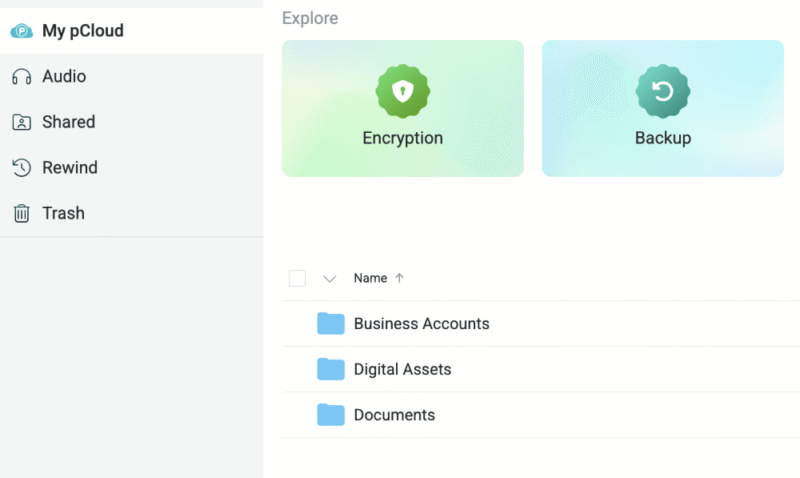
pCloud Pricing & Value
The Business plan costs $15.98 per user per month if you pay annually. This is good value overall, and you can try it for free with a 30-day trial. Read more about the service in our pCloud review.
- 10GB
- 500GB
- 2TB
More plans
- 10TB
- + FREE Encryption
- 2TB
- + FREE Encryption
- 10TB
- Price per user (minimum 3)
- 1TB
- Price per user (minimum 3)
- 2TB
- Encryption for pCloud Drive
4. Proton Drive — Best Enterprise Cloud Storage for Privacy-First Organizations
Proton Drive protects your business with end-to-end encryption and compliance-ready security. You can collaborate on documents, securely store and share files within your organization while controlling permissions and data access. The service comes from the same team behind Proton Mail — one of the world’s largest encrypted email services.
For new business subscribers, the Business Suite costs $14.99 per month per user on a one-month subscription. With a 12-month subscription, the price is $12.99 per month per user. For organizations with custom needs or large teams, Proton offers an Enterprise plan that is fully customizable and includes a dedicated account manager.
Proton Drive stands out for enterprises prioritizing data sovereignty and privacy compliance. The Swiss headquarters places your data outside US and EU intelligence-sharing arrangements, while still offering full GDPR compliance globally.
Proton Drive Hands-On Testing
In our speed tests, Proton Drive delivered impressive results. Uploads were very stable and fast with low CPU usage, and downloads showed the same reliability. During unthrottled testing, we recorded average speeds of 25MB/s, dropping only to around 20MB/s with larger files and peaking at 33MB/s. The desktop app handled our stress test smoothly, uploading files in alphabetical order without hangs or pauses.
The web interface features a modern, visually clear design with multiple color palettes to choose from. The native Proton Docs editor allows real-time collaboration, though formatting options remain basic compared to Google Docs or Microsoft Office. Photo organization on mobile is particularly impressive, with separate tabs for Screenshots, Videos, Selfies, Portraits, Panoramas, Bursts, Live Photos, and RAW files.
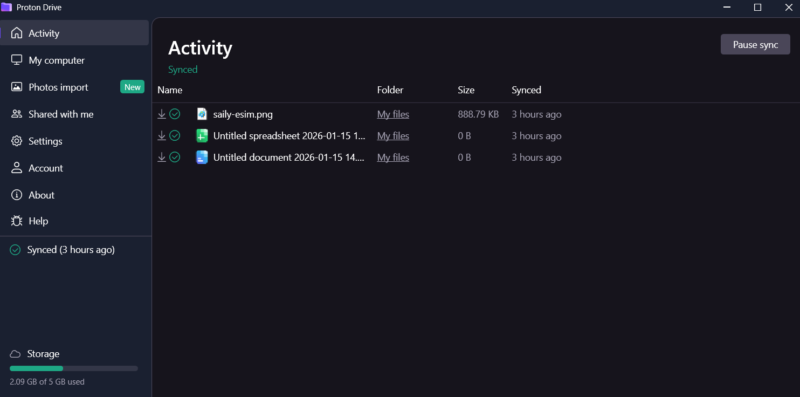
make it ideal for privacy-conscious enterprises.
Proton Drive Pricing & Value
The first plan is Mail Essentials, which includes storage at $9.99 per user per month. The Business plan increases storage for $14.99 per user per month. Like the individual plans, the business plans have subscription options of one or two years. Enterprise plans with custom storage and dedicated account management require contacting sales. Learn more in our Proton Drive review.
- 5GB
- 200GB
- 500GB
More plans
- 1TB
- 3TB
- per user
- 1TB
- per user, minimum of 2 users
- 1TB
- 1TB
5. Internxt — Best Enterprise Cloud Storage for Budget-Conscious Security
Internxt positions itself as a privacy-first alternative to Big Tech cloud providers, offering zero-knowledge AES-256 encryption with post-quantum cryptography to future-proof your data against emerging threats. The Spanish company hosts all data within the EU, making it an attractive option for organizations prioritizing GDPR compliance and data sovereignty.
Internxt offers different pricing plans. The first-year pricing appears exceptionally competitive — with discounts up to 80% off — but be aware that renewal costs jump significantly. For long-term savings, the lifetime plans offer better value, letting you pay once (from around $300 for 1TB) and avoid recurring fees entirely.
Internxt Hands-On Testing
During our speedtests uploads were not so stable, and the service struggled with large files and zip archives, with speeds dropping below 5MB/s during mid-usage CPU spikes. Downloads showed similar instability patterns. During unthrottled testing, the fastest upload speed reached only 13MB/s very briefly, while downloads averaged 26MB/s with peaks around 37MB/s.
The web interface is clean but somewhat basic, lacking features like visible file counts during selection. The desktop app sometimes shows misleading sync status messages. The mobile app is notably sparse, missing automatic uploads and multiple file selection functionality.
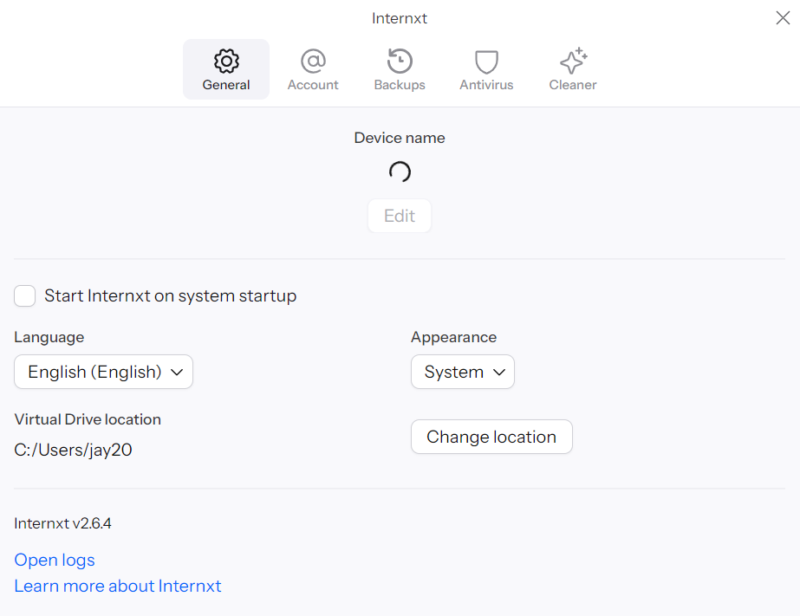
though performance can be inconsistent with larger files.
Internxt Pricing & Value
Internxt’s paid plans come in capacities of 1TB, 3TB and 5TB. At first glance, Internxt has some of the most affordable cloud storage in the market, but the 87% discount is for the first subscription; renewal prices increase substantially. That said, lifetime plans offer better long-term value. Learn more in our Internxt review.
- 1GB
- Post-quantum encryption Zero-knowledge encryption Two-factor authentication Backup your computer Password-protected file sharing Encrypted VPN Antivirus
- 1TB
- Everything in Essential plus; Cleaner Invite, share & collaborate File versioning (coming soon) Cleaner
- 3TB
More plans
- Everything in Premium plus CLI & WebDav support NAS & Rclone support Meet Mail (coming soon)
- 5TB
- Annual Price is per user
- 1TB
- Annual Price is per user
- 2TB
6. Box Enterprise Advanced — Best Cloud Storage for Heavy Use
Box’s Enterprise Advanced plan is all about giving you unlimited functionality. You get limitless storage space and business users, plus powerful generative AI tools to create countless projects. This makes Box the leading option for large enterprises with heavy use cases.
You can upload files of up to 500GB, and you get unlimited file versioning. This means you can go back as far as you need to recover older file iterations. Box is also suitable for enterprises working with a large number of contractors or external clients. You can invite unlimited guests to your account and set security permissions as well.
Box Hands-On Testing
Box is a little more tab-heavy than other services. This doesn’t necessarily make it harder to navigate, but it may be slightly overwhelming for first-time users. The design itself is clean and minimalistic, though the admin center is more drab compared to the homepage.
Moreover, there are some notable issues with the Enterprise plan’s free trial. Firstly, you must provide your credit card details to access the trial. We prefer services that don’t impose this requirement so that users won’t have to worry about incurring high costs.
Secondly, if you already have a Box account, you won’t be eligible for a free trial. When we selected “try for free,” we were automatically logged in to our active account. It’s not immediately obvious that the trial excludes active users, and we were charged over $1,000.
In its defense, Box resolved this situation quickly and gave us a full refund. However, keep this in mind before you try to access the Enterprise plan trial.
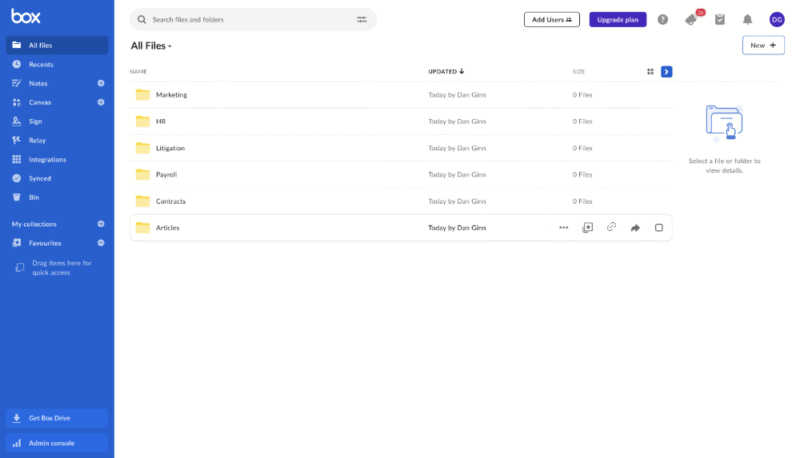
Box Enterprise Advanced Pricing & Value
Box’s Enterprise plans start at $35 per user per month, and the Plus plan costs $50 per user per month. The Advanced plan is negotiable and largely depends on how many users you’re bringing to the table. For more details on its pricing and features, take a look at our Box for Business review.
- Single user
- 10GB
- Single user
- 100GB
- Price per user, minimum of three users
- 100GB
More plans
- Users: No limit
- Unlimited GB
- Users: No limit
- Unlimited GB
- Users: No limit
- Unlimited GB
- Price shown is for one user; minimum 3 users
- Unlimited GB
7. IDrive Enterprise — Best Enterprise Cloud Storage for Online Backup
IDrive Enterprise is for organizations looking to back up company-wide data, including in-house servers. Users can perform remote data backups via the web and mobile apps, and the service also supports network-attached storage (NAS) backups. If company data gets lost, IDrive quickly ships out a physical restoration device so you can get up and running again.
Enterprise users can perform a host of administrative actions remotely. Admins can update settings and push them to all linked devices, as well as run company-wide backups for all devices. Client-side encryption is available for all your data, and there are also advanced data security features, such as the ability to lock out specific users.
IDrive Hands-On Testing
It’s important to understand that IDrive is an online backup solution with cloud storage capabilities. This means it looks slightly different compared to the other solutions on our list. However, once you get the hang of the service, it’s easy to add your devices, run backups and share files.
Some of IDrive’s tabs look a little pixelated. This has zero impact on functionality, but it does feel like you’re using a product from the 2000s. That aside, we have few complaints about the service — IDrive helps us back up our crucial data and restore it with ease, and that’s all we really want.
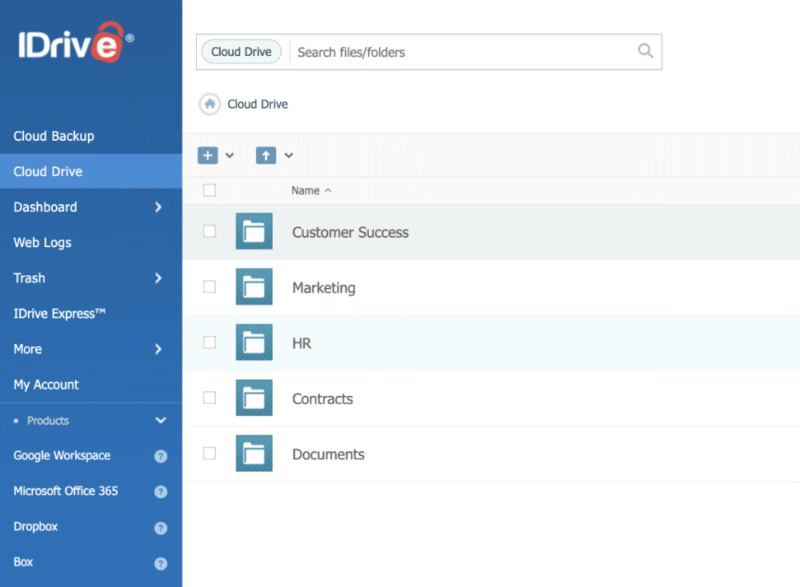
IDrive Pricing & Value
IDrive lets you add unlimited users and get 10TB of backup storage for $199 per month on annual billing. You can back up unlimited machines and access virtual machines as well. That’s good value for large companies — you can learn more about it in our IDrive review.
- No credit card required.
- 10GB
- One user.
- 100GB
- One user, multiple computers. Plans starting from 5TB up to 100TB. Big discount for first-time signup.
- 5TB
More plans
- 5 computers, 5 users. Starting at 5TB up to 500TB. Big discount for first-time signup.
- 5TB
- Monthly Plan storage starts at 1.25TB up to 50TB Unlimited users, multiple computers and servers. NAS devices. 250GB storage. Starting at 250GB up to 50TB. Large discount for first-time signup.
- 250GB
- 5TB
8. OneDrive for Business — Best Cloud Storage for Microsoft Users
OneDrive’s Business package is suitable for enterprises managing sensitive data. One of our favorite features is the sensitivity labels, which help you mark specific files as highly sensitive. You can protect these files through advanced security controls and quickly recover them in case of an accidental deletion or malicious attack.
The Premium plan comes with all of Microsoft’s leading productivity and communication apps. This makes it the perfect option for enterprise-level companies that constantly create and share documents or other file types within their department. Microsoft Defender and Entra ID are also included, ensuring the best protection from third-party attacks.
OneDrive Hands-On Testing
OneDrive has made many improvements to its software in recent years. It looks better than ever, but it’s still not where it should be. The Business Plan is overloaded with tabs, and it takes a long time to really grasp how to get the most out of the platform. The design still feels sterile, even if it is more aligned with modern standards.
Like anything, the more you use a platform, the easier it becomes to navigate. OneDrive certainly isn’t the hardest cloud storage service to use, but you’ll likely need to jump in and out of the knowledgebase, even if you’re an experienced user.
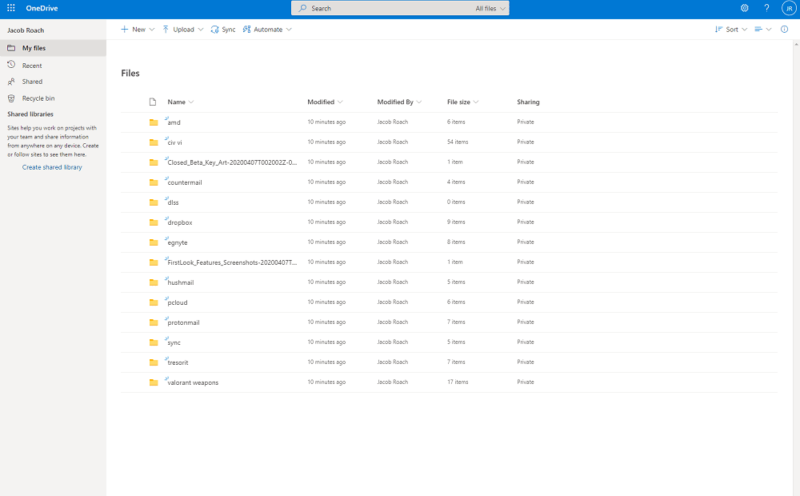
OneDrive Pricing & Value
The Business Premium plan costs $22 per user per month on annual billing. That’s a little pricer than other enterprise options but worthwhile if you depend heavily on Microsoft tools and software. Check out our OneDrive review for more details.
- For one person
- 5GB
- 100GB
- Comes with Office 365 Personal
- 1TB
More plans
- Comes with Office 365 Home
- 6TB
- Price per user
- 1TB
- 1TB
- Price per user
- 1TB
9. Dropbox Enterprise — Best Cloud Storage for Data Governance
Dropbox maintains its streamlined user interface for enterprise packages, making it one of the most beginner-friendly cloud storage services. The Enterprise plan lets you store, protect and retrieve data. In our opinion, it’s one of the best solutions for enterprises that require regular data audits and need to access documents dating back five to 10 years.
The company reserves its best security protocols for enterprise users. You can get real-time notifications anytime the platform suspects suspicious activity on your account. Dropbox regularly runs vulnerability tests, monitors the dark web for leaks and detects ransomware. You can trust that your enterprise-level data will always remain secure.
Dropbox Hands-On Testing
Dropbox is often a front-runner when it comes to offering the best user experience. All its features and functionality fall perfectly into place, making it a great enterprise cloud storage for those requiring smooth workflows. It doesn’t overload you with features either, striking the perfect balance between performance and simplicity.
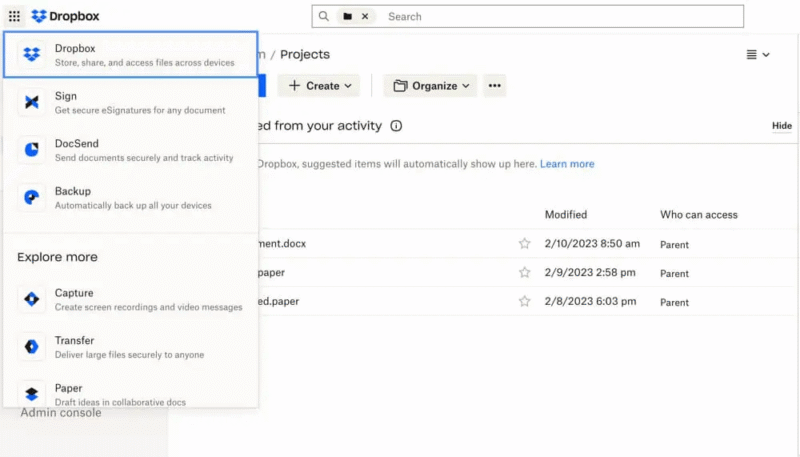
thanks to the plentiful native apps.
Dropbox Pricing & Value
Dropbox allows you to negotiate the price of its Enterprise plan. For reference, the top-tier business plan costs $24 per user per month, so you’ll pay at least that much. You can learn more about its pricing in our Dropbox Business review.
- 2GB
- minimum 3 users
- 5TB
- Price per user
- 3TB
More plans
- Price per user, 30-day free trial (minimum 3 users)
- 9TB
- Price & storage per user, 30-day free trial. (minimum 3 users)
- 15TB
- minimum 1 user
- 3TB
1-month plan
- minimum 3 users
The Best Cloud Computing Platforms for Enterprises
Cloud computing suits enterprises that require optimal control over their internal infrastructure. It allows them to scale with ease, fully manage their security protocols, and deliver applications and software to their end users. Below are three of the leading services that we recommend, including details on what they can do for you.
Microsoft Azure — Best Cloud Computing for Software and Development
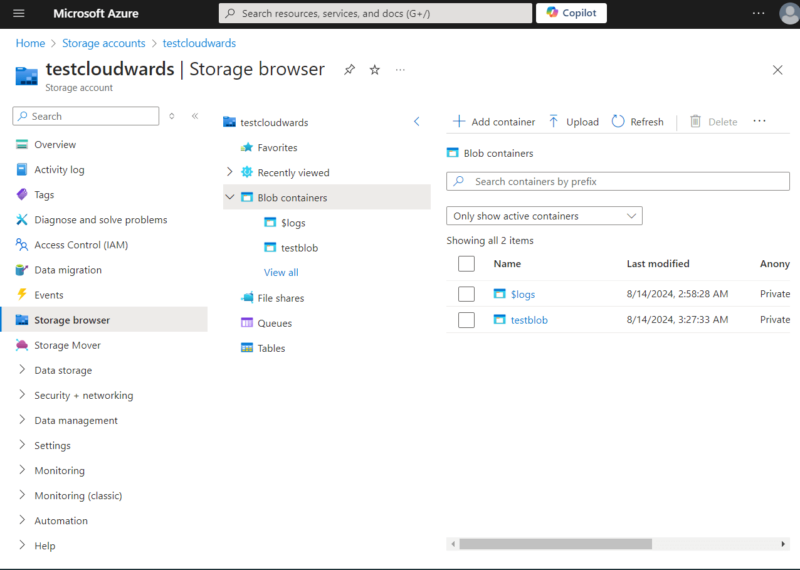
Microsoft Azure is a user-friendly cloud computing platform that offers simple data storage and support for other internal operations. Azure Blob serves as a traditional cloud storage solution, where you can upload everything from documents to videos and other types of unstructured data.
Azure Files lets you share files within your enterprise, but its scope is much wider than that. You can launch company-wide application settings and share software tools between DevOps teams. Loading Azure onto a virtual machine also removes the need for large on-premises file servers, making it a perfect solution for enterprises.
Microsoft Azure Security
On top of its standard encryption, Azure offers plenty of security add-ons. Application Gateway serves as a web application firewall, and Microsoft Defender is a firewall for all your cloud data. Entra ID offers optimal security when it comes to data access, preventing bad actors from gaining entry to your application.
Azure Pricing & Value
When we think of cloud computing for startups, Azure springs to mind first. That’s because it offers a pay-as-you-go structure instead of tying you into long-term commitments. For a full pricing breakdown, you should speak to a sales representative and read our Azure review.
Amazon Web Services — Best Cloud Computing for Security Protocols
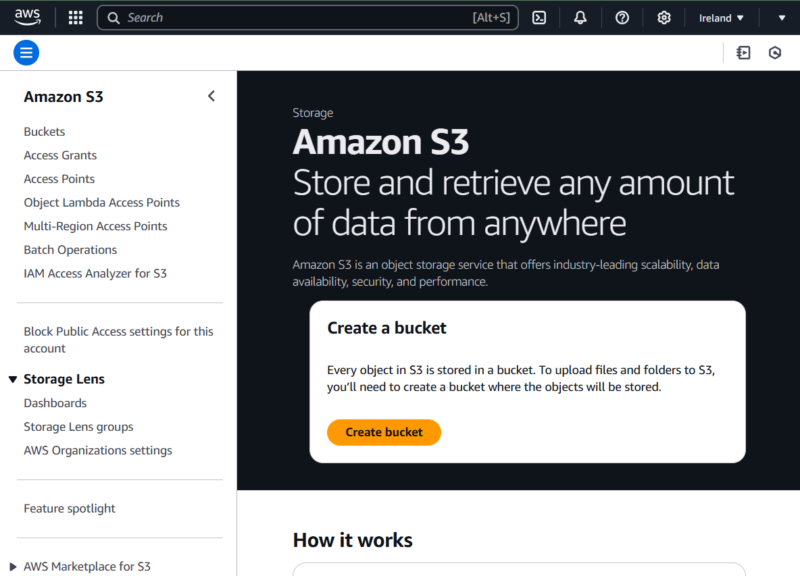
AWS’ powerful cloud computing features are great for enterprise companies with their own Software-as-a-Service (SaaS) solutions. That’s because its global reach allows you to launch and update applications quickly and seamlessly, anywhere in the world. It’s the go-to cloud computing app for companies like Adobe, Facebook and other large corporations.
Users can build relational and NoSQL databases suitable for basic data formats and high-performance, unstructured datasets. Like the other options in this article, AWS lets you fully manage the security of your applications and data. You can also integrate other native apps, like CodeDeploy and WorkSpaces.
Amazon Web Services Security
AWS offers a range of security applications and features to protect your data. Admins can control access privileges, monitor threat detection and add an advanced firewall. The standard encryption is AES 265-bit, which protects data at rest and in transit to the cloud.
Amazon Web Services Pricing & Value
Similar to Azure, AWS doesn’t have a fixed pricing model. Instead, it offers a pay-as-you-go system. The free tier allows you to test-drive some applications before moving to a subscription. Check out our Amazon Web Services guide to learn more.
Google Cloud — Best Cloud Computing for AI Functionality
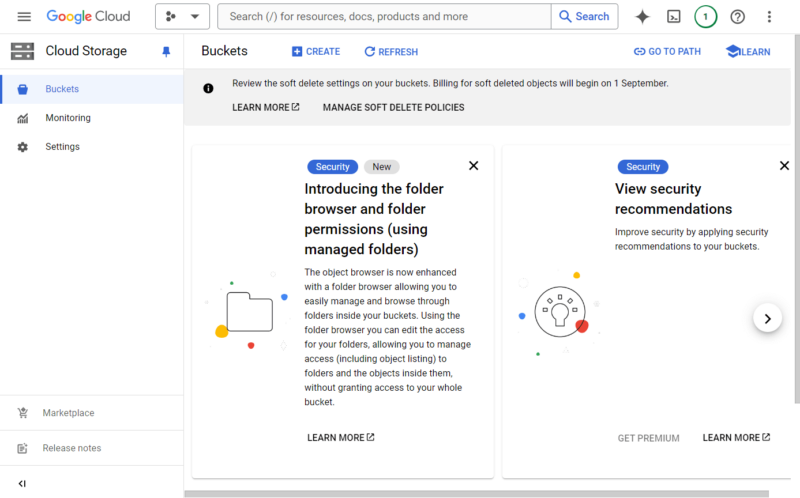
users more advanced security options.
Google Cloud can be as basic or as advanced as you need. All of the company’s apps fall under its Cloud moniker, and some are available for more advanced business practices. You can run virtual machines, create isolated virtual cloud spaces and run your front-end applications with Google Cloud underneath.
If you’re new to cloud computing, don’t worry — Google offers one of the best step-by-step guides we’ve seen during our testing. The company’s data centers stretch across 40 regions, making it the go-to option for global enterprises that want to secure the best performance no matter where their offices are located.
Google Cloud Security
Google uses a blend of TLS and AES encryption to protect your data. For advanced security, the platform implements constant threat detection and real-time incident response assistance from members of the support team.
Google Cloud Pricing & Value
Google Cloud charges only for what you use. Standard cloud storage costs $0.02 per GiB per month. Pricing for Google Cloud’s full services can become quite complex; however, our Google Cloud review offers a full pricing breakdown to help you grasp it.
Our Methodology: How We Tested the Best Corporate Cloud Storage Solutions
Our testing methodology is consistent throughout all of our cloud storage reviews. However, we tweak it slightly when looking at enterprise plans as they tend to offer a unique set of features that you won’t find on lower-end plans.
- Remote admin controls: We test remote admin control functionality to ensure that administrators can create file management systems, add and remove new users, and set company-wide access permissions.
- Storage space: We analyze the available storage space and check if a service throttles speeds for using high-capacity storage. We also focus on the range of storage options to ensure that companies can easily scale if their business grows.
- Speed: We run lab tests on every cloud storage service. This helps us confirm that enterprises can upload and download files quickly while still enjoying a smooth workflow when performing other internal tasks.
- Security: We analyze and test all the security features to ensure that user data remains safe and private when it’s hosted or shared, both internally and externally.
- Ease of use: Enterprise cloud storage is packed with advanced features, so our testing allows us to recommend products that are suitable for all experience levels. The solutions must provide useful tutorials so people can improve their knowledge and maximize their enterprise plan’s functionality.
Advantages & Disadvantages: What Are the Benefits of Enterprise Cloud Storage?
Enterprise cloud storage can be more cost-effective by eliminating large, expensive on-premises servers. High-level plans allow for quick and reliable disaster recovery thanks to features such as server backups and granular restoration tools.
- Cost efficiency: By removing the upfront costs for hardware and maintenance, enterprise cloud storage helps companies better manage their financial resources. This is especially true for cloud computing services, which tend to offer a pay-as-you-go pricing model.
- Scalability: Cloud storage can quickly scale up or down, giving you the flexibility to adjust your infrastructure quickly and easily.
- Advanced security: From access controls to industry-leading encryption protocols, cloud storage is the best way to keep your internal data as secure as possible.
- Global reach: Most leading cloud storage providers have data centers in all major regions around the world. This is perfect for global companies that want to enjoy the best performance across all their offices.
What Are the Different Types of Enterprise Cloud Storage?
Not all enterprise cloud storage solutions are built the same, and each offers different use cases. Below are some of the core types of enterprise cloud storage available.
- Public cloud: This cloud computing infrastructure is built by a third-party company. It is publicly available to users and organizations.
- Private cloud: This cloud storage has features and tools built exclusively to serve a single organization or enterprise while delivering optimal levels of security and privacy.
- Hybrid cloud: This method combines both public and private infrastructure, as well as on-premises backup systems.
- Enterprise multi-cloud storage: This type of service integrates multiple public cloud storage solutions. It can increase storage capacity, or expand features and functionality.
- Mobile cloud: This cloud storage is specifically optimized for mobile devices to improve functionality on native or third-party business applications.
Which Cloud Storage Solution Offers the Best Integration With Other Enterprise Tools?
Google is the market leader when it comes to offering wide-ranging enterprise integrations with other tools. Beyond Google Drive, Google Cloud offers cloud computing services, plus a bundle of business and productivity apps that you can blend into your infrastructure.
How Much Cloud Storage Do Enterprise Companies Need?
The answer greatly depends on your company’s direction and area of expertise. If you work with large files and aim to grow your workforce, then unlimited storage space is the optimal solution. Smaller enterprises that depend more on documents should be fine with capacities ranging from 2TB to 5TB.
Is Cloud Storage Secure Enough for Enterprise Use?
Cloud storage is one of the most secure methods of backing up your data. At a minimum, all services use industry-standard encryption such as AES 265-bit and TLS/SSL to protect your data, which is widely considered impossible to break through.
Enterprise users can also access a host of advanced security features. Granular access controls, password protection for files and folders, and real-time notifications for potential breaches are just some of the features available.
The leading services are also privacy-focused. For example, Sync.com, pCloud and IDrive all offer client-side encryption. This means that only people within your enterprise can access your files and data — even the companies that host your data don’t have access.
The Role of Machine Learning and Artificial Intelligence in Enterprise Cloud Software
More systems are adding AI features and tools to their enterprise solutions. Microsoft heavily embeds Copilot into its enterprise accounts, allowing users to quickly account for and generate business-centric documentation. Similarly, Google is using Gemini as its AI-powered automation to help you achieve your business needs and objectives.
Final Thoughts
Our selection of the best enterprise cloud storage should help you start building your internal systems. Remember to make the most of free trials, and know that prices are negotiable depending on your company’s size. If enterprise plans offer more than what you need, check out our selection of cloud storage for business users.
What do you think about our selection? Which services do you currently use? Is there an enterprise solution you would like us to review? Let us know in the comments. Thanks for reading.
FAQ: Enterprise Cloud Storage
Enterprise cloud storage is designed for larger teams and organizations. Users can expect higher storage capacities, more in-depth security features and a higher level of customer support from your provider.
Pricing for 10TB of cloud storage varies depending on the provider. However, you can expect to pay between $20 and $50 per month for 10TB.








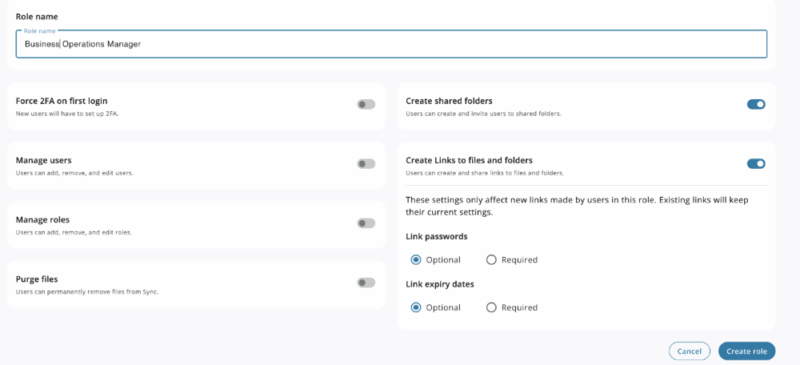

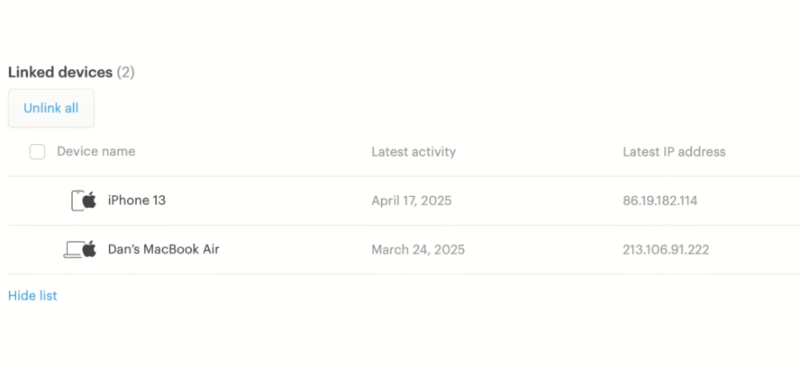

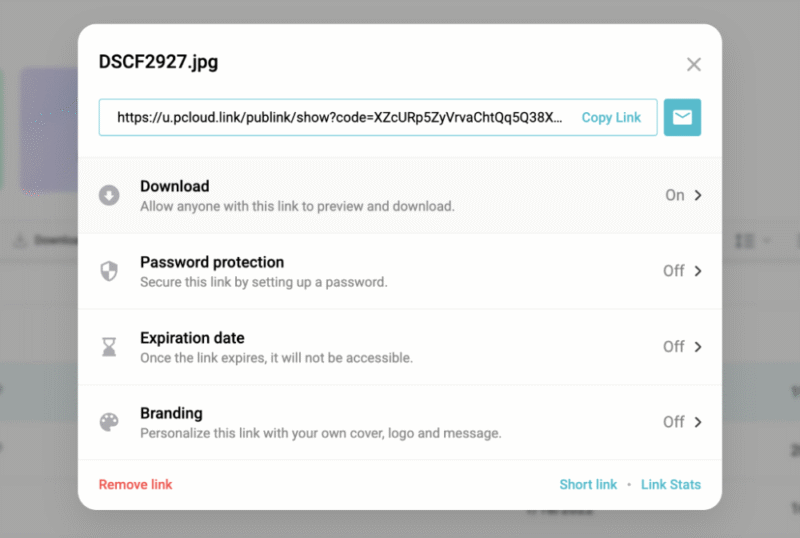
![Video thumbnail for the video: I Tested Proton Drive to See If It's as Private as It Claims [2024 REVIEW]](https://img.youtube.com/vi/XWmsFdm-VLg/maxresdefault.jpg)
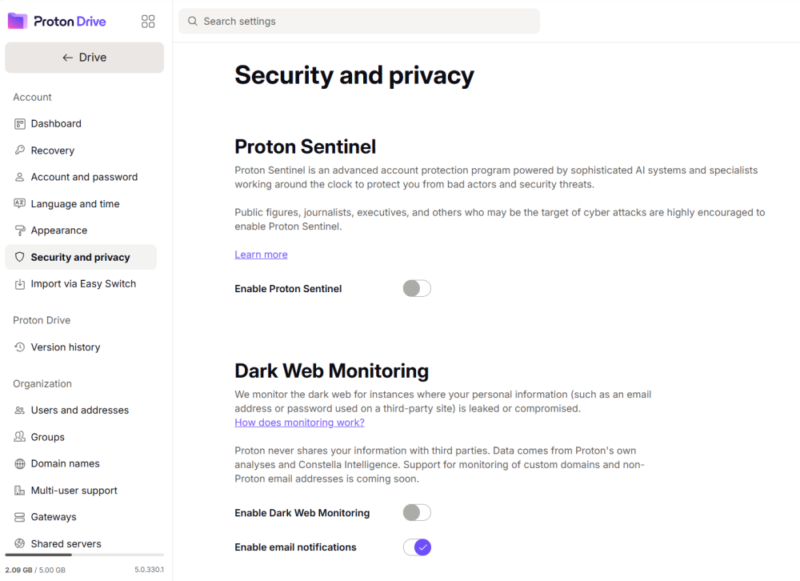

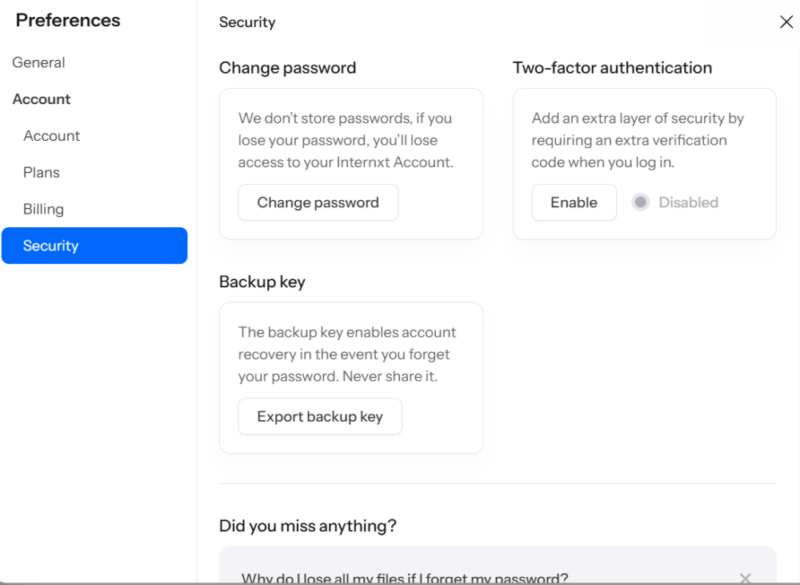

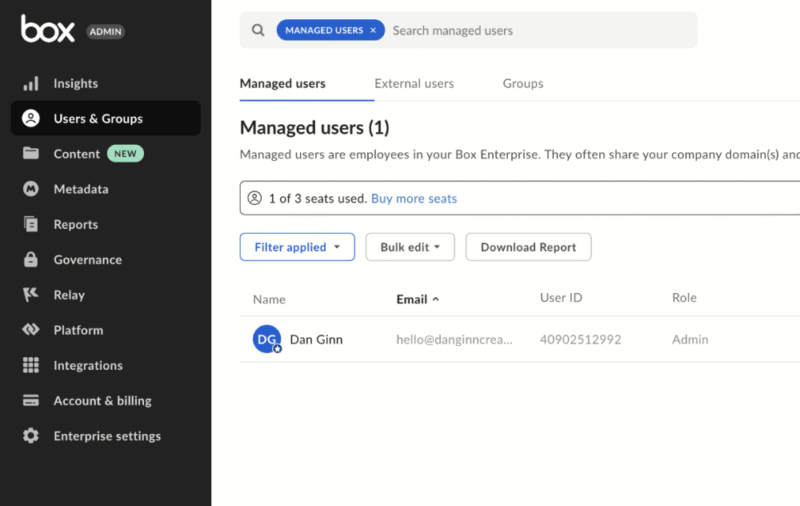

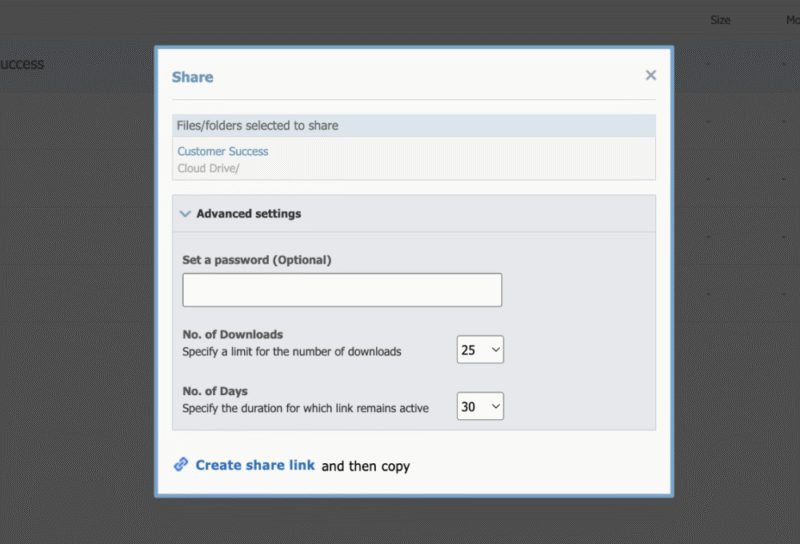

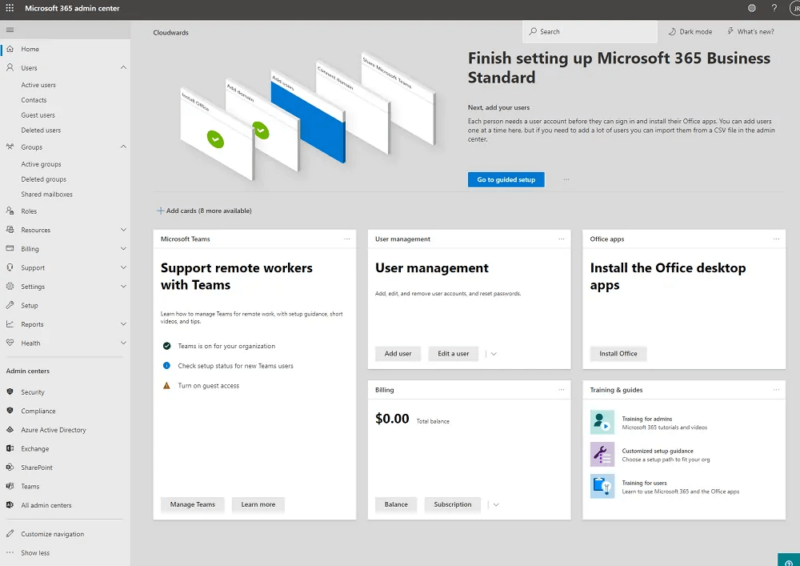
![Video thumbnail for the video: Should You Still Use Dropbox in 2024? [Updated Review]](https://img.youtube.com/vi/bwy8HZ1Uvnk/maxresdefault.jpg)
